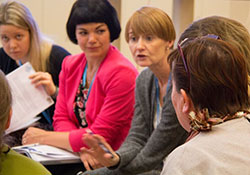New course builds “soft skills” for greater health equity and well-being in policy

WHO
On 8–10 June 2016, WHO/Europe held the first "flagship" course on Equity in Health in All Policies (eHiAP). The course is designed to build capacity in the "soft skills" needed to bridge policies and sectors to ensure greater health equity and well-being. The soft skills required for policy implementation are agenda-setting, stakeholder analysis and negotiating with a wide range of policy-makers. The participants included individuals from the Nordic and Baltic countries who work at national, regional and local levels to shape and implement policies to improve health outcomes.
Lisabeth Holm Olesen, who works in Copenhagen City, welcomed training to enhance soft skills: "WHO traditionally has a huge role in communicating with governments, using technical skills to address leaders. Working with soft skills is actually more difficult but also more helpful for listening and creating fruitful dialogue between sectors." She felt that the most valuable skill she learnt was "how to frame challenges in the right way, so they are presented as a 'common goal' to which all sectors work through individual, more refined goals."
A member of the Icelandic Prime Minister's Office, Una María Óskarsdóttir, said, "Often, we do not realize what made our initiatives succeed; we forget to go back and dissect the efforts that contributed to success. This course was a good opportunity to reflect and share what works and what doesn't with individuals at different levels and in different countries in Europe."
No longer "hammering on a wall without doors and windows"
Tone Poulsson Torgersen, who works in the Norwegian Directorate of Health, agreed and stated, "You may have the best policy, but if you are not framing the issues correctly and in a way that echoes the political ambitions, you will never move forward… it is like hammering on a wall without any doors or windows." She said that the eHiAP course helps policy-makers to "take a look in a mirror to make sure we are doing it the right way, questioning and challenging our typical approach."
Elisabeth Skoog Garås, a senior advisor at the Swedish Association of Local Authorities and Regions views health equity as a common meeting ground for all sectors: "If you're just talking about equity in general, you have a breaking-point between politicians; you're either red or blue. But when you say health equity, you have this meeting point. It's something everyone can talk about. No one thinks inequity in health is OK, because it is never OK for someone to live in poor health."
Inspired by participants' positive feedback, future eHiAP courses will be held in early spring 2017 for central European countries and in autumn 2017 for southern and eastern European countries, as part of efforts to improve health equity policy across the European Region.



